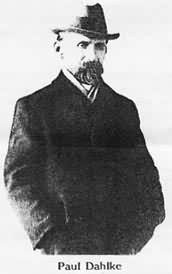When I was first introduced to Buddhism, over ten years ago now in early University days, I found the ‘Noble Truth’ of suffering to be profoundly pessimistic. That only lasted a few days, fortunately, as I had a great professor who showed the broader context and meaning of this central aspect of Buddhism. I have since come to see Buddhist cosmology as neither pessimistic nor optimistic, but rather morally balanced; perhaps, in a word: indifferent.
So I was struck today in reading the accounts of the effect this has had on two fellow Westerners who have stumbled into Buddhism, Paul Dahlke and Dave Webster. Paul Dahlke (1865-1928), pioneer of Buddhism in Germany and founder of “Buddhistische Haus” in Berlin, wrote the following of Buddhist ethics in 1908:
… I stand in the universe quite alone travelling in utter solitude the path of Samsara. My deed alone goes with me, but not as a companion, only as my shadow. Thus I travel on like a man at evening wending his way eastwards over an infinite stretch of snowy plain or through an endless waste of sand, with nothing behind him but the long trail of his own footsteps, nothing before him but a giant shadow; beside himself — nothing.
And in a post at his Dispirited blog (book review forthcoming), Dave Webster had this to say:
While others may choose to focus on the consolations that faith offers post-death, I am much more interested in this indifference. It seems instructive. Post-death threats and promises have not promoted ethics, and many religious thinkers have also taken this view. I am sure that there are those who believe (and claim evidence, but this is another matter), to an extent, that death is survivable: but I am not interested in that. The evidence is sketchy (at very best), and this world is without us once we die. It is this world that interests me. A mortal being is what we are to this world. Even if we look beyond death, this world is a place where we are mortal. It is only effected by what we do before death. What happens beyond is irrelevant.
As for the Buddha, it’s not clear what he thought of ‘beyond’ death. He considered questions about what happens to an awakened being after death to be a profound waste of time. When he was challeneged to teach about the finitude/infinitude of the cosmos and the afterlife of awakened ones, he suggested:
It’s just as if a man were wounded with an arrow thickly smeared with poison. His friends & companions, kinsmen & relatives would provide him with a surgeon, and the man would say, ‘I won’t have this arrow removed until I know whether the man who wounded me was a noble warrior, a brahman, a merchant, or a worker.’
He would say, ‘I won’t have this arrow removed until I know the given name & clan name of the man who wounded me…
until I know whether he was tall, medium, or short…
until I know whether he was dark, ruddy-brown, or golden-colored…
until I know his home village, town, or city…
until I know whether the bow with which I was wounded was a long bow or a crossbow…
until I know whether the bowstring with which I was wounded was fiber, bamboo threads, sinew, hemp, or bark…
until I know whether the shaft with which I was wounded was wild or cultivated…
until I know whether the feathers of the shaft with which I was wounded were those of a vulture, a stork, a hawk, a peacock, or another bird…
until I know whether the shaft with which I was wounded was bound with the sinew of an ox, a water buffalo, a langur, or a monkey.’He would say, ‘I won’t have this arrow removed until I know whether the shaft with which I was wounded was that of a common arrow, a curved arrow, a barbed, a calf-toothed, or an oleander arrow.’ The man would die and those things would still remain unknown to him.
“In the same way, if anyone were to say, ‘I won’t live the holy life under the Blessed One as long as he does not declare to me that ‘The cosmos is eternal,’… or that ‘After death a Tathagata neither exists nor does not exist,’ the man would die and those things would still remain undeclared by the Tathagata. (MN 63, emphasis mine)
In the recent movie The Grey, Liam Neeson plays a character who sounds an aweful lot like this. He has lost his wife and nearly his entire will to live, but as his companions in the dark, frozen north begin talking about faith, hope, and God, he tells them, “I wish I could believe in that stuff. But this is real: the cold. That’s real: the air in my lungs…” When a companion asks him, “What about faith?” He just answers, “What about it?”
The character is neither emotionally cold nor nihilistic though. The flashbacks to him with his wife show his warmth, but here, now, he walks alone. It seems to be this balanced approach that keeps him alive as others perish, one distracted and fearful, another just giving up.












